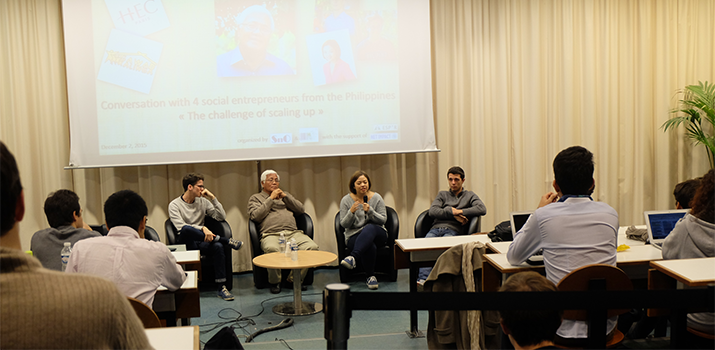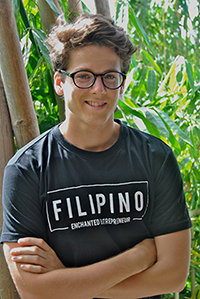“The challenge of scaling up”: a conference with 4 exceptional entrepreneurs from the Philippines
Antonio Meloto, CEO and founder of Gawad Kalinga (GK), came to campus with 3 younger entrepreneurs to share their experiences in social entrepreneurship.

On December 2, students from HEC Paris had the privilege to attend a very inspiring roundtable with 4 social entrepreneurs. The main speaker was Antonio Meloto, CEO and founder of Gawad Kalinga (GK), a humanitarian organization that aims to eradicate poverty in the Philippines. The organization focuses on sustainable community building through the creation of “GK villages” to address housing, education, environment and health issues.
Antonio Meloto is also responsible for the Centre for Social Innovation (CSI), an incubator for young social entrepreneurs.
He delivered his testimony on Gawad Kalinga movement, claiming “With GK we’ve built a solidarity alliance of hope in the fight against poverty.” He announced that GK has currently been able to build one million homes in the Philippines for the poor. In his speech, he also stated that in order to be able to create wealth in a country such as the Philippines, it is essential to attract the most talented young entrepreneurs from western countries.
He was accompanied on stage by his daughter, Camille Meloto, R&D and Marketing director of the social enterprise Human Nature, Fabien Courteille, founder of Plush& Play and Louis Faure an HEC Paris student who recently launched a poultry farm at GK Enchanted farm. The 3 young people presented their business and answered questions asked by the audience.
We sat down with HEC student Louis Faure, who shares his vision of entrepreneurship and his best memories from HEC Paris.
- Why did you become a Social Entrepreneur? What support & leverage do you get from GK?

During my time at HEC, I felt that we were privileged with the best education and the greatest opportunities, and so we should aim to do so much more than just making a comfortable living for ourselves and our families. Looking for a dream to believe in, I flew to the Philippines and discovered my purpose in life by working with the poorest of the poor. I realized that by matching my competencies with theirs, by bridging the deprived rural areas with the high end circles of Manila, we could create inclusive wealth that would benefit the bottom of the pyramid whilst preserving the environment. I couldn't have started without the support of GK, because they had created this platform that brings together the rich and the poor, public and private sectors, students and teachers, investors and entrepreneurs. They gave me access to the resources I lacked and provided me with the right environment to make my mistakes and learn from them.
- What are the key success factors of your business? What is your main focus?
On one hand, the business model is centered on a full understanding of the local context and the needs of the industry and, after a year of immersion, research and trial & error. On the other hand, we're being provided with the necessary resources such as financial support, mentoring from successful social entrepreneurs, media coverage, on-site market base and access to reliable workers and experts in the field. My focus is to develop the missing part: our own expertise in productive organic chicken farming, within the peculiar context of poor small-holders with limited access to quality supplies. Once we reach that, this will define our main competitive advantage and our specificity as a social enterprise.
- What advice would you give to students regarding their current studies and future career?
Not to be afraid to step out of their comfort zone and seek different kinds of experiences. For me traveling, and actually traveling alone, is the key to gain confidence in who we are and what we want to do with our lives.
- Did you join any clubs or associations at HEC Paris?
When I was at HEC, I would spend most of my time boxing in the Fight Club association, rehearsing as a dancer for Backstage and working on setting up my own association with two friends: “La Petite Épicerie”, a grocery store distributing Asian food supplies on campus.
- What are some of the highlights of your studies at HEC so far?
I certainly have many highlights of my studies in HEC, but I guess the ones that really shaped my experience are those related to entrepreneurship, such as the academies (I did e-commerce), the conferences bringing in inspiring entrepreneurs or the workshops such as introduction to coding. The main one, however, remains my exchange program in Tokyo, as it has greatly influenced my choices since then, notably bringing me back to Asia where I eventually found my place.
This event was organized by the Society & Organizations (SnO) Center, the MSc in Sustainability & Social Innovation, the ESP’R student association and the Social Business/Enterprise and Poverty Chair.